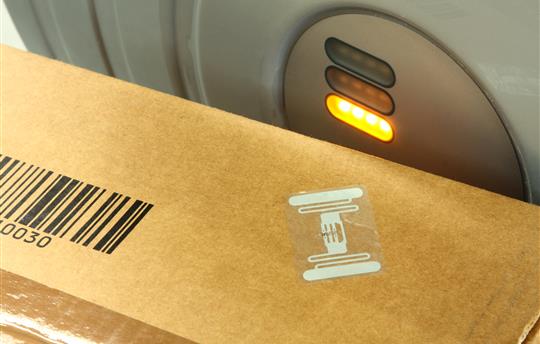10 Benefits of Consolidating Your Packaging and Smart Label Providers
8/15/2025

According to a new Gartner survey, 71% of supply chain organizations still lack the key strengths needed to handle future challenges. For many businesses, fragmented vendor relationships for packaging, smart labeling, and kitting contribute to this weakness, leading to disjointed workflows, inconsistent quality, and unnecessary costs. By consolidating these and related functions under a single partner, companies can unlock meaningful operational gains and long-term cost savings.
Whether you're navigating rapid growth, tightening margins, economic headwinds, or increasing retailer demands, here are ten benefits to streamlining your packaging and smart label partners:
1. Tighter operational alignment
When packaging and smart labels, such as radio-frequency identification (RFID) tags, are produced under one roof, workflows become smoother. That means fewer handoffs, faster communication, and greater control across your product lifecycle.
Consolidation can also reduce process touchpoints, which in turn can accelerate speed-to-market and improve quality consistency. For example, RRD recently helped a leading CPG manufacturer consolidate down to a single packaging and label partner, which ultimately streamlined communication and control across teams — increasing operational efficiency.
2. End-to-end traceability
Integrated packaging, smart label programs, and supply chain management simplify compliance and traceability — from factory to shelf — because the process isn’t being handed off between multiple vendors across the supply chain. This is critical for brands in perishables, health, or regulated categories.
A 2025 pilot test in pharma supply chains conducted at Michigan State University achieved 100% traceability of products across a simulated end-to-end distribution network. This real-time tracking capability shows how a consolidated labeling approach can meet strict traceability requirements and improve supply chain transparency.
3. Smarter material and substrate decisions
Label and folding carton performance rely on matching the right material and structure to the right application and environment. When these decisions are made in silos, brands can encounter issues like adhesive failure, scanning problems, or product damage. A consolidated partner can test label and packaging compatibility up front before production begins. This reduces the risk of rework and helps keep launches on track.
4. Faster speed to market
Separate vendors mean more approvals, rework, and delays. Strategic consolidation with a single partner shortens new product roll-out times by eliminating redundant steps. By speeding up artwork proofing, label encoding, and product fulfillment under one integrated process, brands can get products on shelves faster — and respond more quickly to market demands.
5. Greater smart label encoding accuracy
Every misencoded label can waste product, hurt compliance, or delay shipments. With a single source, you get better quality control, in-line verification, and fewer surprises.
A great example of this is a global retailer who recently partnered with RRD to source and affix encoded smart labels. They successfully met specs and enabled real-time inventory tracking across stores and warehouses. This single-source approach to smart labels — with in-line encoding and verification — ultimately yields more reliable data and fewer errors than fragmented or manual tagging processes.
6. Centralized compliance and fulfillment oversight
When a single partner manages packaging, smart labels, kitting, and fulfillment, quality assurance becomes part of the process. This eliminates the need for a last-minute review. Fewer handoffs mean fewer chances for errors. A single-source global partner operating certified facilities can help streamline line clearance, reduce labeling inconsistencies, and support packaging that aligns with cGMP and SQF standards. This triple-play model enables smoother operations and stronger compliance without added complexity.
7. Streamlined procurement and spend management
Fewer vendors mean fewer purchase orders — and reduced complexity. Fewer vendors also streamlines strategic sourcing and integration planning across packaging, labeling, and supply chain management. Industry guidance notes that higher volume purchases with a single supplier can lead to significant cost savings.
Additionally, a reduction in suppliers translates to fewer purchase orders and contracts to manage. This lowers administrative overhead and increases spend visibility across SKUs.
8. Unified data strategy
When your packaging and label workflows are connected, so is your data. This enables inventory visibility, automation, and digital supply chain analytics. Data silos remain a pervasive issue within the CPG industry.
A McKinsey report suggests that companies breaking down data silos across departments and systems can achieve significant performance gains. In the CPG sector, firms that adopted a holistic data integration approach saw up to a 15% increase in sales. In one retailer’s case, implementing a unified data strategy resulted in an 18% sales boost, driven by better inventory management and analytics.
9. Consistent branding across formats
Using a single partner for all formats — including folding cartons, labels, tags, and more — helps support consistency in color, layout, and logo use across SKU, channel, and packaging types. A unified approach also supports proper placement and formatting of encoded labels for retail compliance and logistics.
Research indicates that strong brand consistency across channels can increase revenues by up to 33%. By consolidating packaging and smart label production, companies can maintain consistent branding across all items and formats, while also strengthening supply chain resilience by reducing their dependence on multiple partners. This boosts brand recognition and consumer trust, whether the product is viewed on a shelf or online.
10. Simplified innovation and scale
Need to roll out a pilot? Test a new tag? Launch a new product line fast? A consolidated partner can help you scale without starting from scratch.
When a major manufacturer needed to comply with a retailer’s new RFID mandate, for example, RRD developed a folding carton with a built-in smart label — no redesigns, no extra label steps. The carton preserved brand integrity, shipped ready to go, and accelerated the launch. With one partner managing both packaging and smart labels, the rollout was faster, cleaner, and compliant.
Ready to consolidate?
When packaging and smart labeling work together, everything else works better. Consolidating your partners isn’t just operationally smart; it’s a strategic move that strengthens performance, compliance, and speed to market. Explore what’s possible with RRD’s integrated packaging, labeling, and supply chain solutions.